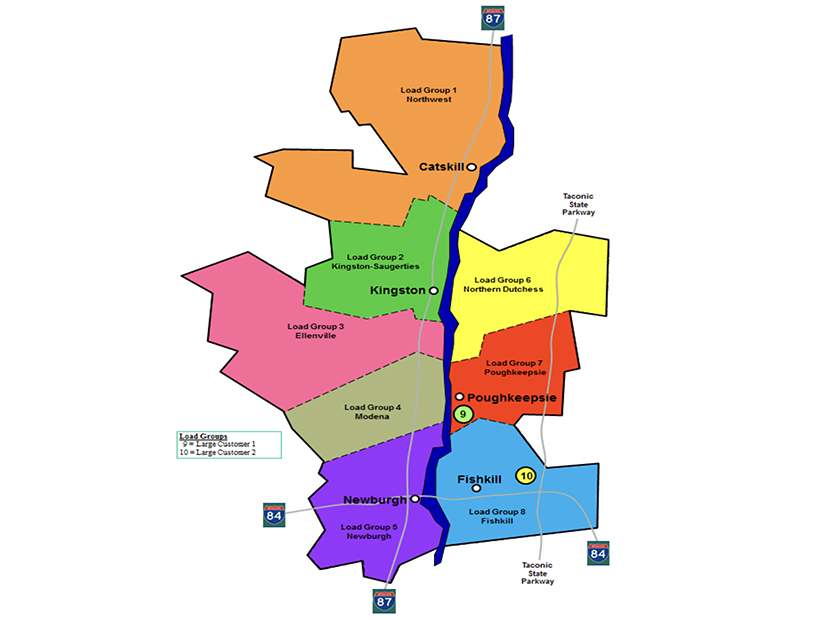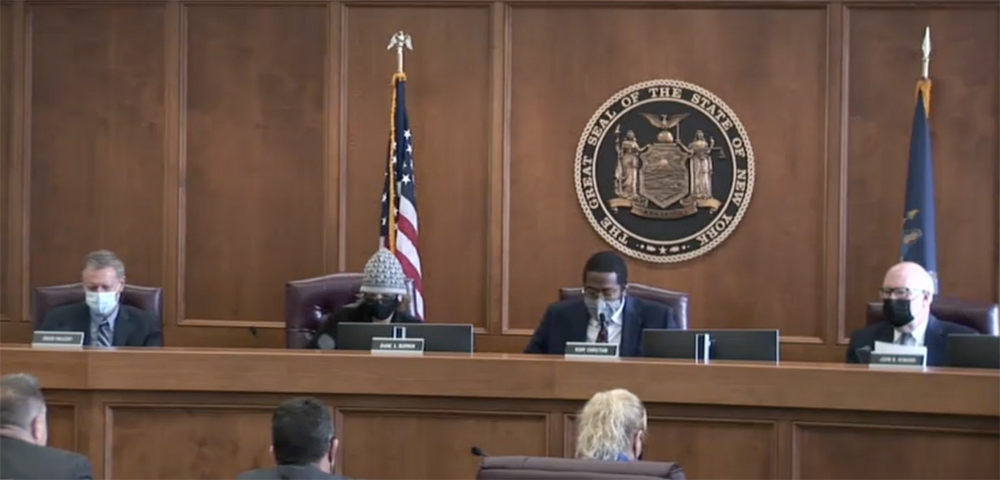New York regulators on Thursday approved a three-year rate plan for Central Hudson Gas and Electric, effective retroactively to July 1, 2021, praising the joint proposal made by the utility, consumer advocates and Department of Public Service staff as a model for other utilities to follow (Cases No. 20-E-0428; 20-G-0429; 20-M-0134).
The approved joint proposal balances varied interests while also ensuring the utility’s continued provision of safe and reliable service, furthering the goals of New York’s nation-leading Climate Leadership and Community Protection Act (CLCPA), and mitigating impacts to ratepayers, especially those suffering the financial effects of the COVID-19 pandemic, said Administrative Law Judge Michael Clarke.
Under the new rate plan, Central Hudson will identify ways to reduce its carbon emissions, targeting cumulative savings of 2019 gas and electric sales in the next four years by 2.5% and 6.9%, respectively, and will decommission by yearend 2025 its gas-powered 20 MW Coxsackie and 23 MW South Cairo power plants.
Central Hudson will expand access and increase bill discounts for low-income customers, including a $4.5 million customer bill moderation credit. It will pause residential service terminations as well as service metrics for uncollectible bills through 2022, and continue its Back to Business economic development program providing financial assistance to small businesses.
The New York Public Service Commission held its regular monthly session in hybrid fashion November 18, 2021, meeting both in person and via videoconference. | NYDPS
Clarke quoted one of the parties to the joint proposal, the Alliance for a Green Economy, as saying the plan “contains numerous provisions that represent meaningful compromise among normally adversarial parties and which specifically concede to the public interest positions taken by not-for-profit public interest organizations who represent constituencies within the company’s service territory.”
The Public Utility Law Project said the agreement’s mitigation of rate increases, low-income provisions, COVID-19 considerations and consumer protections, as well as efforts to promote the goals of the CLCPA are in the public interest.
“Of great interest to me is the adjustments towards declining block rates, which are viewed by some as a de facto incentive for greater gas use,” Public Service Commission Chair Rory Christian said. “By flattening those rates, you remove that incentive and better align customer use of natural gas with the overall goals of the CLCPA.”
The New York DPS defines a block rate as a commodity rate structure where blocks of consumption are sold at different rates to recognize differences in cost of service. Most commonly the block rates decline as consumption increases.
As part of the rate plan’s climate-related initiatives, Central Hudson will conduct a geothermal district loop feasibility study to identify potential project sites. The study will be funded by electric customers and capped at $250,000. If the study identifies a suitable project site, Central Hudson will discuss development with the commission to ensure it is consistent with state policies and ongoing community thermal system work at the New York State Energy Research and Development Authority.
Rate Design
The new rate plan allows a 9% return on equity and will decrease electric base delivery revenues by $3.1 million the first year but increase them in the following two years by $19.5 million and $20.7 million, respectively. Gas base delivery revenues would increase in each of the three rate years, going up by $4.7 million the first year, then by $6.3 million and $6.4 million, respectively, in the succeeding two years.
The PSC’s order said an earnings sharing mechanism “is triggered if the company’s actual ROE exceeds 9.5% in any rate year (after certain adjustments). Earnings above 9.5% to 10% would be shared equally between Central Hudson and ratepayers; ratepayers would receive 75% of any earnings greater than 10% up to 10.5%; and ratepayers would receive 90% of any earnings over 10.5%.”
Central Hudson customers may not understand how electric rates regulated to go down a bit by the order may actually rise substantially with the increase in commodity prices being experienced now, Commissioner John B. Howard said: “Let people know that the commodity portion that will be affecting their bill is not what we’re voting on here today. We’re voting on a delivery rate that is separate and apart.”
This settlement discussion should be a model that other companies follow, Commissioner Tracey A. Edwards said. She also thanked the utility “for recognizing that we are in a diverse state” and creating a Spanish-language website and offering translation of other languages.
Regulating ESCOs
The PSC also announced steps related to eight energy service companies, or ESCOs, operating in New York, denying permits to four companies, prohibiting another from further marketing or enrolling new customers, and allowing one company to serve low-income customers after demonstrating its ability to provide guaranteed savings (Cases No. 12-M-0476; 21-M-0491; 21-E-0490).
The commission in December 2019 placed ESCOs under new restrictions and requirements that they must honor in order to sell to the state’s residential customers and small business owners. (See NYPSC Reins in ESCOs, Expands Community DG.)
“Our ongoing efforts to improve the ESCO market remains a priority,” Christian said. “When an ESCO proves they are fair to customers, we allow them to continue their activities in New York to bring choice and energy services to customers.”
The commission denied SunSea Energy, Starion Energy NY, Smart One Energy and Josco Energy’s applications for eligibility to serve mass-market customers after staff found that each of the four firms knowingly made false and misleading statements in its application to do business.
The PSC ordered that Got Gas? and Graystone Technologies each show cause within 30 days why their eligibility to act as an ESCO in New York should not be revoked for allegedly violating the commission’s uniform business practices rules. Neither company has customers in New York.
The commission also approved NOCO Electric and NOCO Natural Gas’ request to serve low-income customers.




